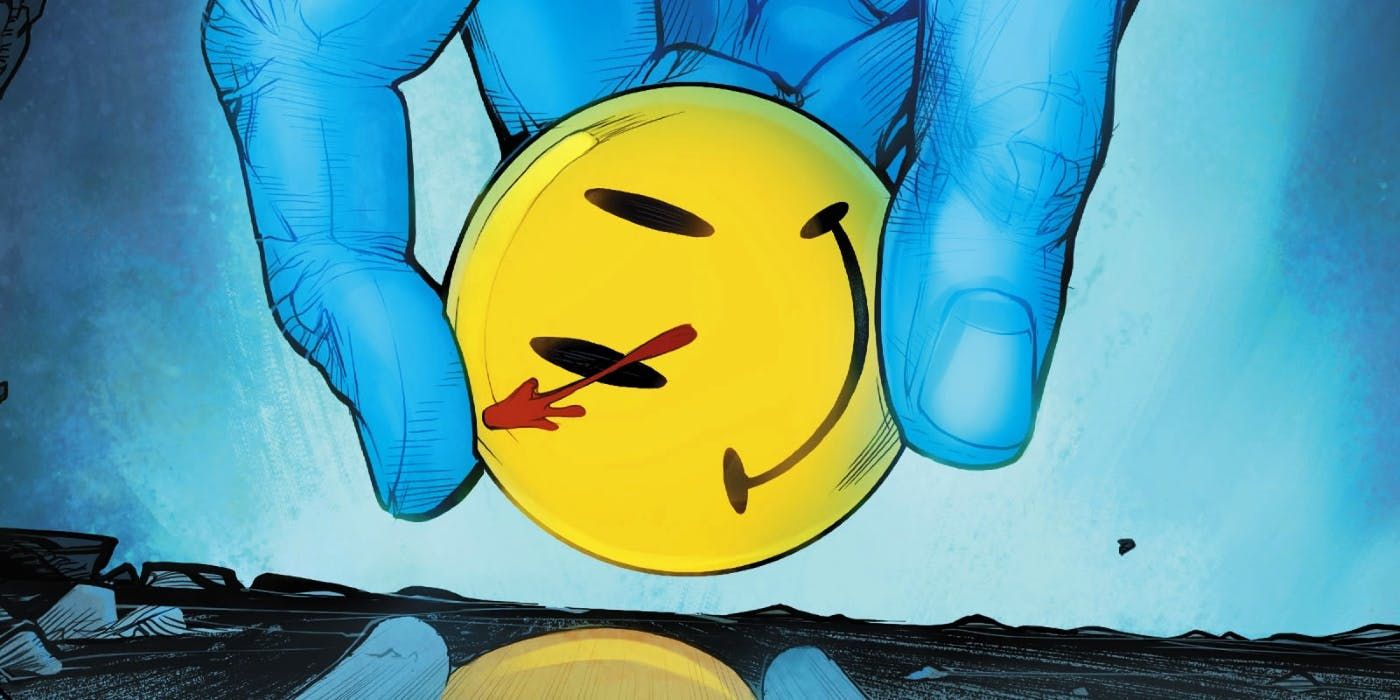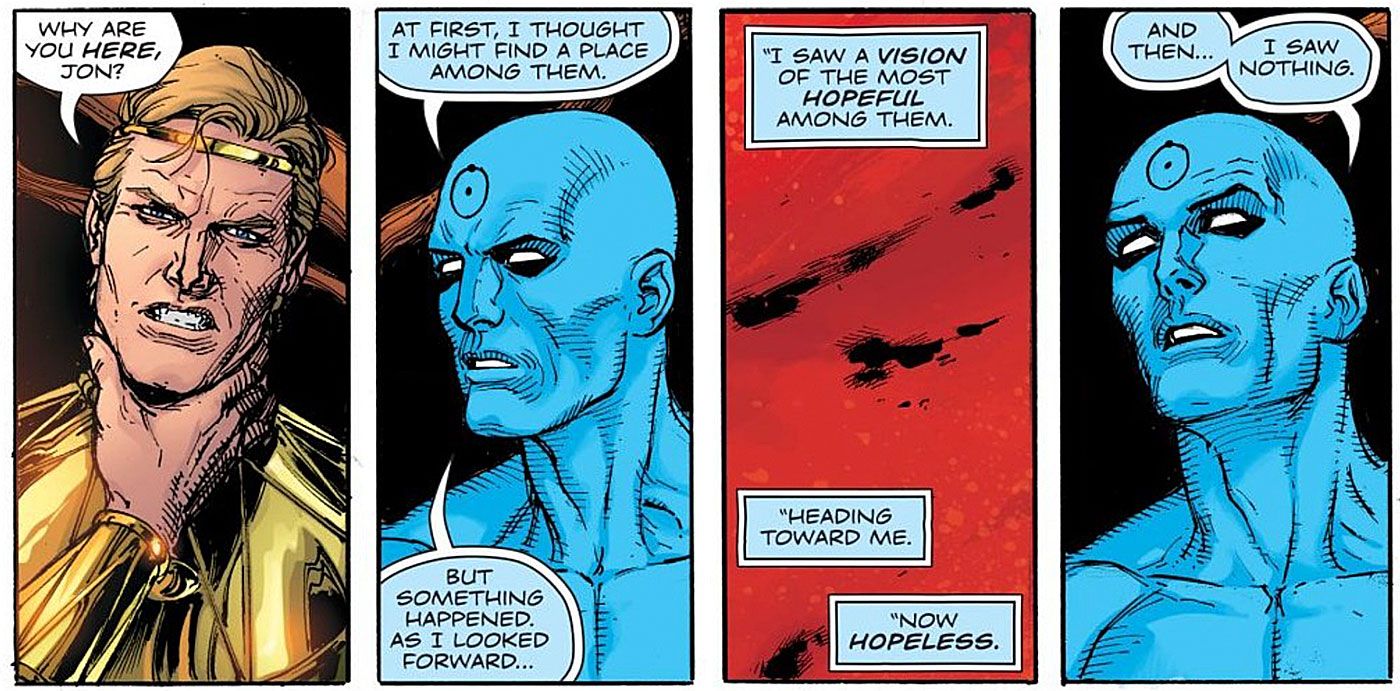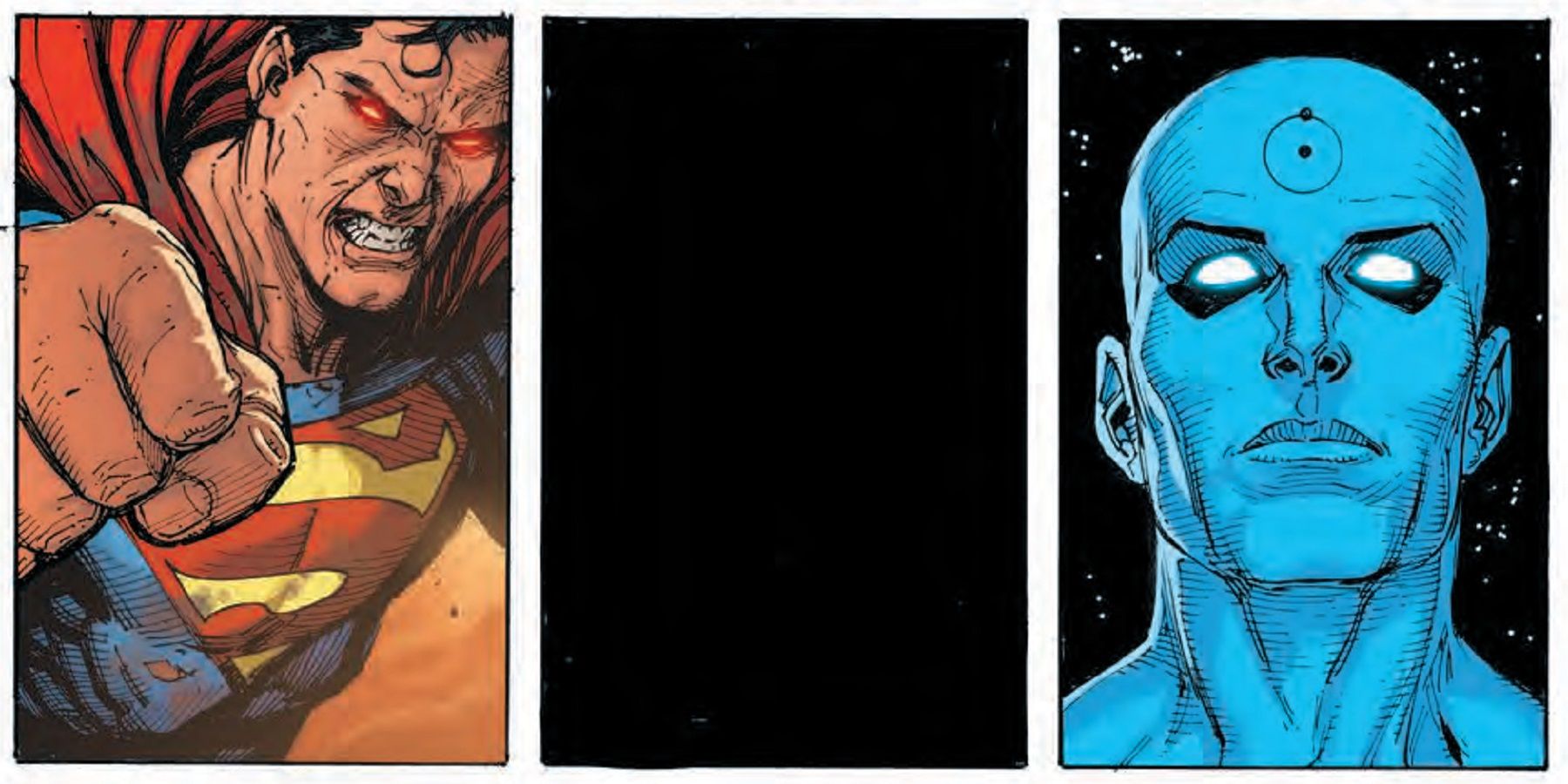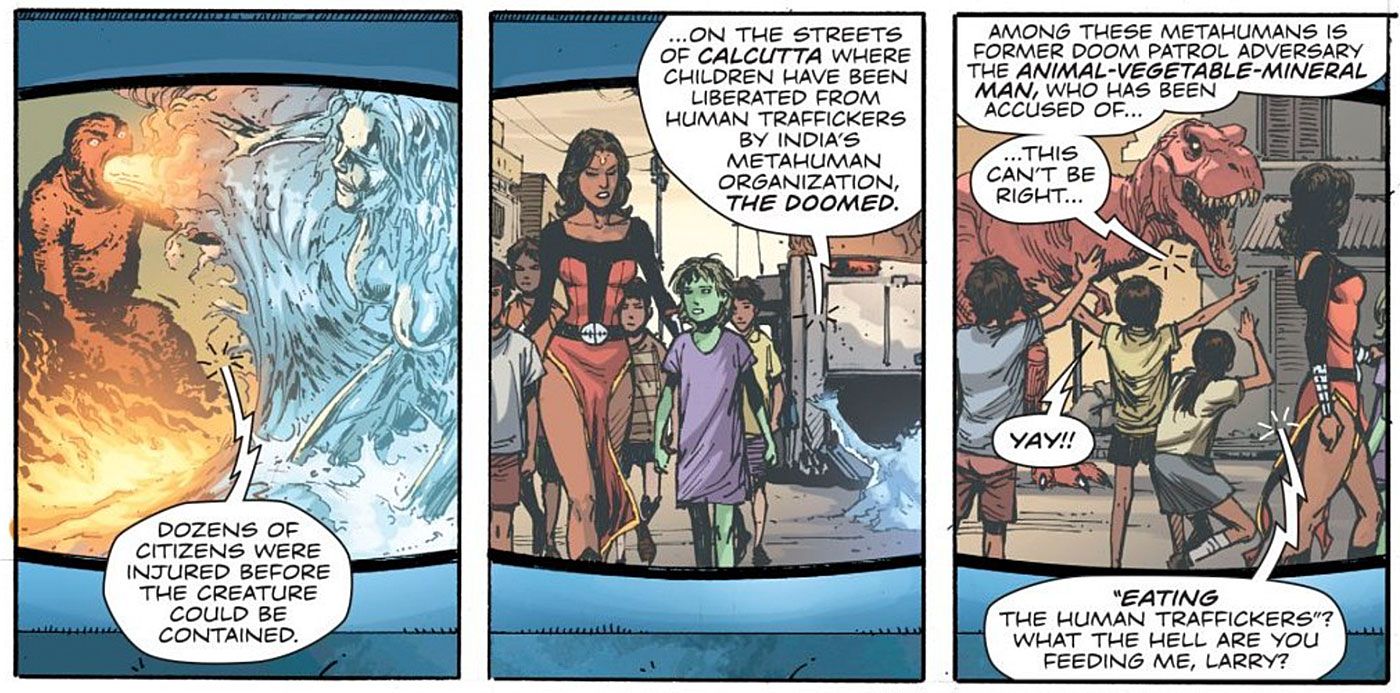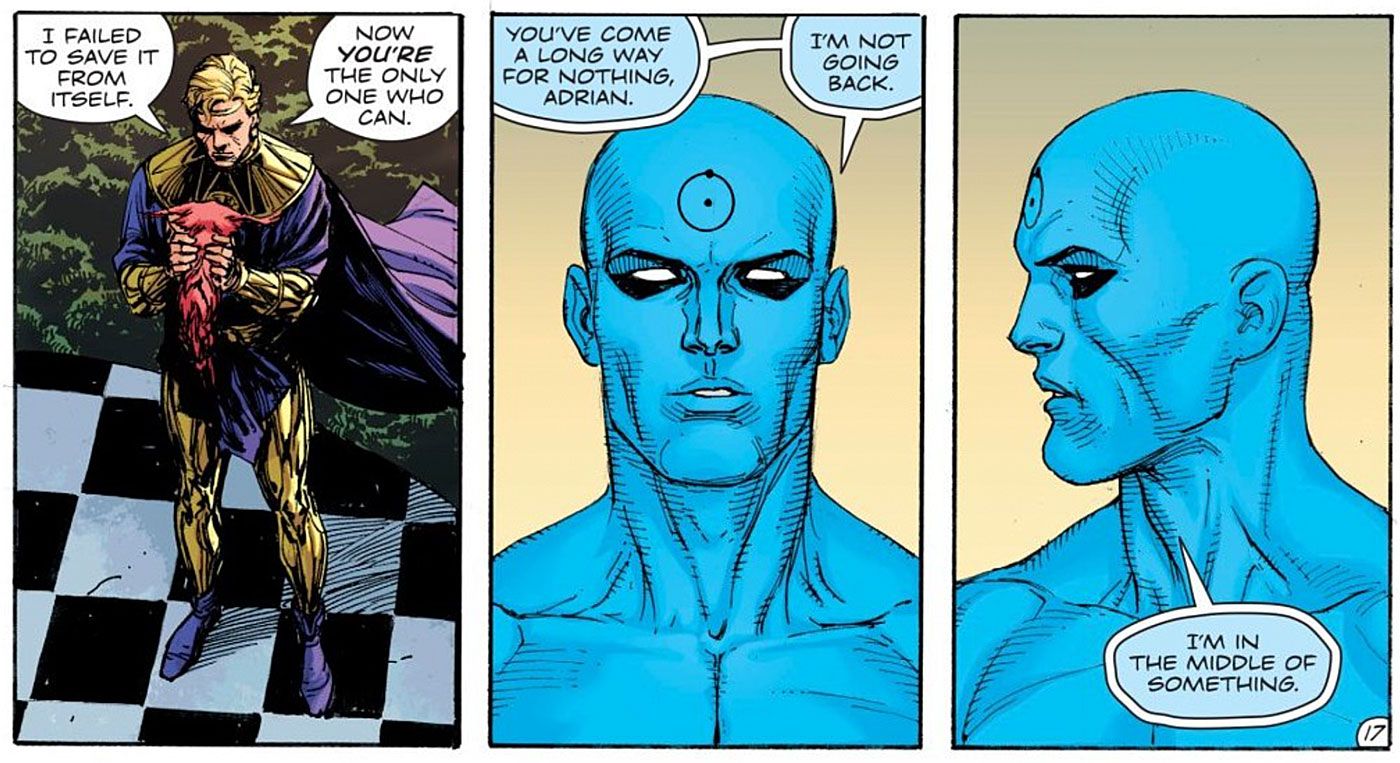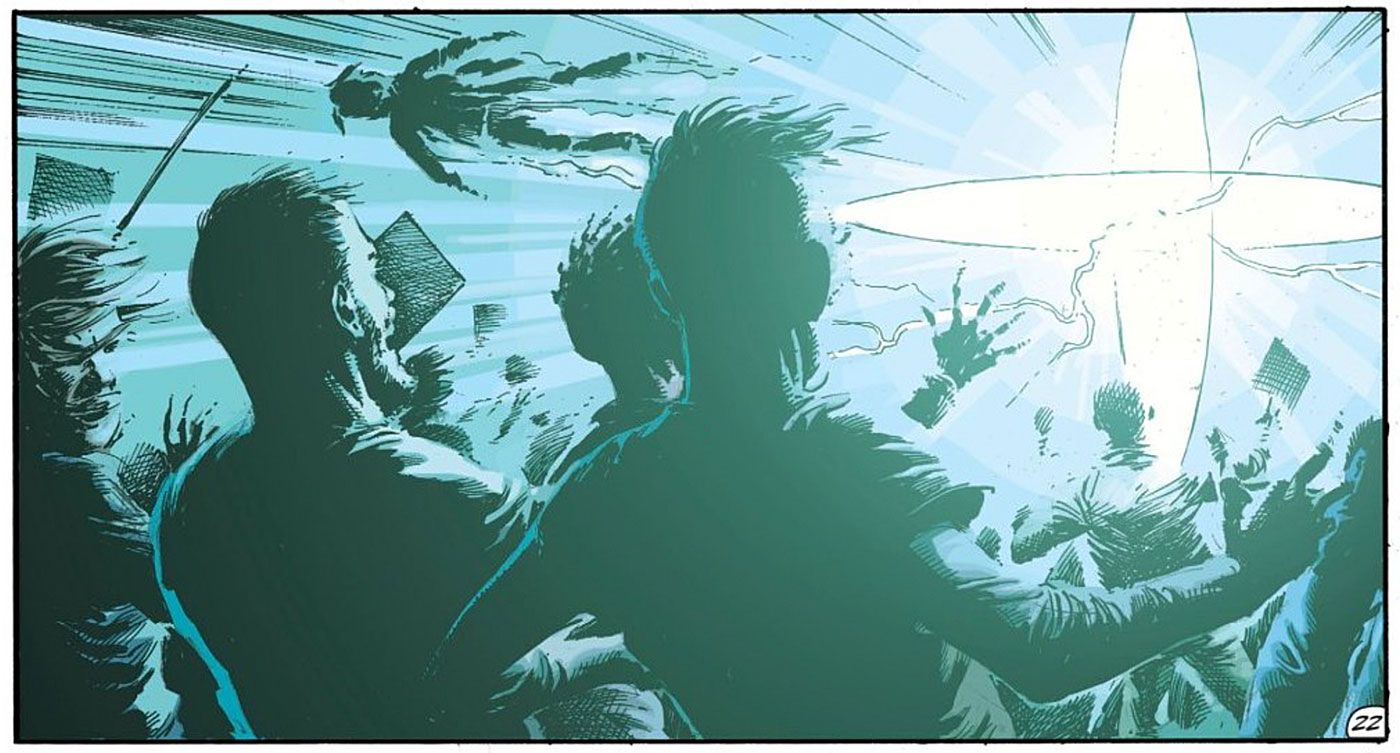WARNING: The following article contains major spoilers for Doomsday Clock #7 by Geoff Johns and Gary Frank, on sale now.
When DC Comics ushered in its Rebirth initiative over two years ago, fans interpreted the term "rebirth" in different ways. Some saw it simply as DC coming to its senses after five years of the oft-criticized New 52, while others took it more literally, hoping for the eventual return of many favorite and long-absent characters.
The inaugural and far-reaching one-shot DC Comics: Rebirth appeased both camps, at least to some degree. As intended, the comic whetted readers' appetites for answers, both to existing questions and ones raised within the context of the story. Still unanswered, though, is just exactly what, or who, still stands to be reborn before the Rebirth era is finished.
Geoff Johns and Gary Frank's Doomsday Clock #7 may have just provided some answers.
RELATED: Doomsday Clock #7 Gives Us the Moment We’ve All Been Waiting For
Doc Manhattan Destroys the DC Universe?
The latest issue of Doomsday Clock starts off by uncovering a troubling revelation. After journeying from the world of Watchmen to Earth-0, Doctor Manhattan directly intervened in history and changed the fate of the man destined to become the original Green Lantern, Alan Scott. This issue is the first definitive acknowledgement of Manhattan meddling with events of DC history.
His interference has long been suspected, though. Characters like Wally West, Jay Garrick and Saturn Girl have found their way back into continuity in varying ways after having been absent for years. Their return coincides with the arrival of Doctor Manhattan in the DCU, making it hard to imagine he didn't have something to do with it.
Journey to the Center of the Multiverse
Before Doctor Manhattan started treating the DC Universe like his own private sandbox, he had to go find it first. He presumably left his own world, disgruntled over its decline, in search of a better one. In Doomsday Clock's current issue, regarding the world he now calls home, Manhattan tells Adrian Veidt that he initially believed he could "live among them," which could be a reference to Earth's population or the world's metahumans -- Doc Manhattan was the only character known to have superpowers in his world.
Clearly, something changed Doc's mind. That something was one of his own future visions, revealing him battling an angered Superman. Curiously, Manhattan sees nothing beyond that, save for blackness, as if he has no future beyond that moment. The vision served to disillusion Manhattan -- if the world's greatest embodiment of hope could be brought to this state, then there is likely no hope for this world.
If It Ain't Broke -- Break It
Manhattan didn't really need a disheartening vision of the future to lose hope for this world. He has clearly been here a while -- certainly long enough to see the sociopolitical climate of this world isn't all that different from the one he left. The world's nations are creating and stockpiling their own superheroes, ready to defend themselves against other nations in a metahuman arms race. Manhattan's world was one where its own superheroes had brought the planet to the brink of war.
Seeing that his new world is no place for him, Manhattan has therefore apparently decided to try and change it. As he tells Veidt, he's "in the middle of something," and what he's in the middle of appears to be messing with history -- specifically, superhero history. And he has been pretty productive -- it's probably no coincidence that there's no Justice Society of America in a world where Alan Scott's destiny was fatally altered.
Page 2: [valnet-url-page page=2 paginated=0 text='The DC Universe May Be Reborn Out Of Doctor Manhattan’s Meddling']
If He Can't Have It, Then No One Can
Whatever Doctor Manhattan had planned for retconning history, it apparently doesn't work, as his future vision shows him. Manhattan considers two possibilities -- either that Superman kills him, or that Manhattan himself kills Superman, along with everyone and everything else. A rather dire prediction, either way.
RELATED: Doomsday Clock: Gary Frank Teases Superman/Doctor Manhattan Encounter
Given that Doctor Manhattan has the power to traverse realities and alter history, it's unlikely that even Superman has the capability to destroy him -- if his moral code would even allow that in the first place. Manhattan's latter and more apocalyptic scenario is the more likely of the two, and not hard to extrapolate from his current position.
Manhattan abandoned his own world at its darkest hour, so he's clearly not above throwing up his big blue arms in defeat. As he becomes similarly disillusioned with his new world, the notion that he would also give up on this one isn't unlikely. Does he perhaps think, as Ozymandias once did, that destruction is the means to salvation?
Salvation, or …
Perhaps Doctor Manhattan has come to realize that abandonment isn't the answer, and that he's now willing to go to more extreme lengths to save the world, just like his former colleague. He was, after all, more than willing to allow Veidt go through with his genocidal plan, so hatching his own plan of mass destruction isn't that far-fetched. But what kind of weapon of mass destruction could he use to accomplish such a large-scale feat?
How about... himself? In a potential nod to Zack Snyder tweaking Alan Moore's original script in the 2009 film, Doctor Manhattan himself could be the self-destructive weapon needed to set things right. Manhattan's final vision shows what appears to be himself exploding -- a decidedly apocalyptic move that might have been the very thing Superman was trying to prevent in his vision. But, considering the nature of his powers, such a move by Manhattan wouldn't necessarily be purely destructive. It could actually end up serving as the means to save the world.
… Rebirth?
One of the more unique aspects of Manhattan's powers is that his consciousness exists across time, not just in the present. It raises the potential question of what exactly would happen to him if he were killed. Would he just cease to be, like anyone else? Or would his death reverberate through the duration of his existence? If he were to die, might he just disappear across time?
RELATED: Doomsday Clock Picks Up the JSA’s Long Anticipated Rebirth Plot Thread
If so, his death could indeed be the very key to saving the world, and he just might have come to realize that. If Doctor Manhattan's destruction results in his erasure from existence, then he never would have existed in the Watchmen's world. He never would have ventured to this one. He never would have allowed Alan Scott to die. No other heroes would have been removed from history. Nothing would have stopped the Justice Society of America from forming.
All that which has been retconned away by Doctor Manhattan's intervention would now be free to stage its own… rebirth.
Such a continuity-altering conclusion is the hallmark of a typical DC Comics event. Its apocalyptic ending would also follow in the tradition of Watchmen's own startling climax. And perhaps, most importantly, it would redeem the character of Doctor Manhattan, who would go down as the hero who saved the DC Universe -- both literally and figuratively.

